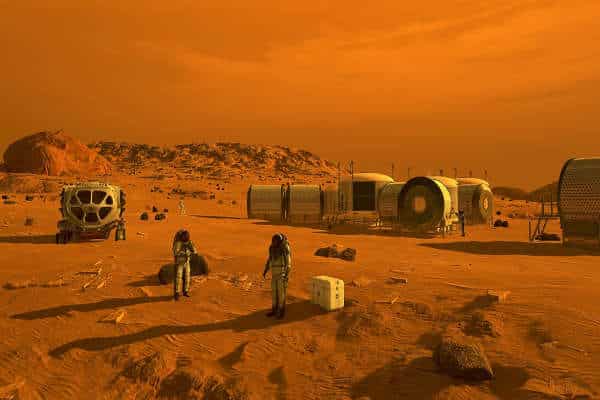Planet Mars is visible to the naked eye, meaning you can see it without the use of a telescope or binoculars. However, this doesn’t mean it’s easy to figure out what is going on up there!
What we do know is that it is a terrestrial planet which means that it has a hard rocky surface that you could walk on. The Red planet is very similar to Earth, and scientists are trying to find out if life was present there. If life was present there in the past, maybe humans could exist on it in the future… But before we start to think about why humans would need to do this, let’s learn a bit more about this epic place first.
Named after the Roman God of war, Mars is the fourth planet from the sun in our solar system. Mars is also known as the ‘Red Planet’ because, well, it’s red! This signature colour comes from the large amount of a chemical called iron oxide in its rocks and soil. Basically, its reddish appearance is caused by the presence of rusty iron in the ground.
Mars is the second smallest planet in the solar system after Mercury. With a diameter of 6,791 kilometres, it’s roughly half the size of Earth. Like Earth, Mars has seasons, polar ice caps, volcanoes, canyons, and weather. However, unlike Earth, Mars has two moons. One is called Phobos and the other Deimos.
It can get pretty cold on Mars –– much colder than our own planet since it’s further away from the sun. At the equator, temperatures can reach 20°C, but at its poles they can plummet to as low as -140°C. I mean, come on! That is much, much colder than Antarctica!
Mars is home to the highest mountain in our solar system –– a volcano called Olympus Mons. Standing a whopping 24 kilometres high, it’s about three times the height of Mount Everest. Believe it or not, there are bits of Mars here on Earth. In the past, asteroids hit the Red Planet, sending debris into space. Some of this debris landed on our planet as meteorites.
If humans could exist on Mars, it’s pretty weird to think about what life would be like. You could jump around three times higher on Mars than you can on Earth. This is because the planet’s gravity – the force that keeps us on the ground – is much weaker. A day on Mars is 24 hours and 37 minutes –– only a little bit longer than a day on our own planet. A year on Mars, however, is almost twice as long, lasting 687 Earth days! This is because it takes a lot longer than Earth to complete its orbit around the Sun.
Until recently, scientists believed that there was no liquid water on the surface of Mars –– only rocks, soil dust and ice. But in 2018, they found evidence of a lake under the planet’s south polar ice cap. There are signs of ancient floods on Mars, but now water mostly exists in icy dirt and thin clouds. On some Martian hillsides, there is evidence of liquid salty water in the ground.
Humans have not yet been to Mars as we are not yet confident they could survive there, but scientists have sent spacecrafts there to help them research this fascinating planet. The first spacecraft to land on Mars were the Viking Landers, which touched down on the surface in 1976. Scientists want to know if Mars may have had living things in the past. They also want to know if Mars could support life now or in the future. Now, why do you think this is?
Critical Thinking Questions:
- If Mars is the most hospitable planet in the Solar System, what do you think is the most inhospitable? Why?
- Why is it important that scientists have found evidence of water on Mars?
- If you weighed 100kg on Earth, how much would you weigh on Mars? (*Hint: It is a lot less!).
Practical Thinking Questions:
- Why are scientists interested in whether Mars could support life now or in the future?
- What does Climate Change have to do with this?
- If you were asked to be one of the first humans to live on Mars, would you want to? Why/why not? Make a list of pros and cons













i..i just want to go to live on mars tho-
wait -140°c?!?! um… i only said who would live on mars!not me!